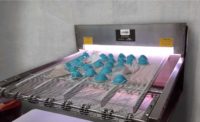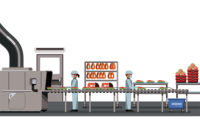Minimizing lawsuit risk during the pandemic

The Coronavirus pandemic has brought many new threats to the meat industry, from worker illnesses to supply chain disruptions. The threat of lawsuits can be added to this list – not just from employees who have been sickened while working at a plant, but also from shareholders. These “shareholder derivative lawsuits” have been filed in the travel and pharmaceutical industries, and it is conceivable that they could become prevalent in the food processing industry as well.
We spoke with Sean Meluney, partner at Benesch Friedlander Coplan & Aronoff LLP, to discuss some of the legal ramifications that companies may face.
Provisioneronline: What are shareholder derivative lawsuits?
Sean Meluney: A derivative suit is a lawsuit brought by a stockholder, on behalf of the corporation, to enforce a claim belonging to the corporation. Typically, derivative claims involve claims against a director or officer when the company has sustained an injury that hurts the value of the corporation’s stock or assets. The most common types of derivative claims are those involving allegations of mismanagement or breach of fiduciary duty.
How have they been filed in other industries in regards to the COVID pandemic, and why might they be filed in the meat industry?
The spread of Coronavirus shook the economy and led to a sudden stock market decline. Because of this global health crises, those in the meat industry were faced with unprecedented, complex legal and operational issues. A review of the cases filed to date show that the claims filed so far have focused on (1) stock-drop lawsuits, (2) false or misleading statements about the pandemic’s impact on the company, (3) failure to disclose deficiencies, (4) overly optimistic statements to stockholders, and (5) failure of boards to exercise proper oversight.
While not in the COVID-19 context, the Delaware Supreme Court’s Marchand v. Barnhill case provides some context in terms of how these types of cases can arise. Marchand involved a derivative suit against the board of company that produced ice cream. The company suffered a Listeria outbreak in 2015 that forced the company to recall all its products, stop production, and undergo massive layoffs. The company’s board of directors were sued in a derivative lawsuit for failing in its oversight and compliance-monitoring roles, which led to claims based on a breach of the board’s duty of loyalty. The board failed to implement any Board-level system of compliance monitoring and reporting to identify red-flags before the outbreak.
For the meat industry, boards of directors need to implement a board-level system of monitoring the impacts of COVID-19, as an outbreak could lead to safety issues for employees, understaffing, and an inability to continue production in a profitable and efficient way.
What would be the results of those lawsuits, if the processors are sued and lose?
The distinction between derivative lawsuits and other traditional types of civil cases is important for several reasons. On the most basic level, a derivative suit advances a corporate claim and the recovery that results should go directly to the corporation itself. Derivative actions can also be brought to achieve a variety of remedies, such as injunctions to prevent harmful action and corporate governance enforcement and reform. Attorney fees are, of course, also recoverable in shareholder derivative litigation. Delaware case law supports a wide range of reasonable percentages for attorneys’ fees, but 33% is the very top of the range of percentages. Additionally, the shareholder plaintiffs typically receive a portion of any settlement based on the value of their contributions.
There have been lawsuits filed by families of meat plant workers who died from COVID-19. What would those lawsuits have to prove in order for them to move forward?
As companies operate during COVID-19, they face heightened risk of personal injury and wrongful death claims based on allegations that a person was exposed to COVID-19 due to defendants’ failure to follow state and federal guidance. While these are a different species of claim than a corporate derivative action, personal injury and wrongful death actions present the greatest threat to companies operating in the meat processing industry.
There have been several wrongful death lawsuits filed recently. One such case was filed in Philadelphia Common Pleas Court, alleging that JBS USA ignored federal COVID-19 guidelines and worker safety. And a similar lawsuit was filed against SmithField Foods, Inc. by employees at a rural Missouri pork-processing facility. These lawsuits may be part of the beginning of a litigation wave against meat companies, based in part on these companies’ failure to provide proper testing and monitoring for individuals who may have been exposed to COVID-19.
How can processors protect themselves from lawsuits should one of their employees get seriously ill or die?
Companies must take steps to address the risks of COVID-19. These steps include adhering to federal, state and local guidance, but it also extends to having written policies and procedures, educating employees, and informing employees of confirmed cases of COVID-19.
President Trump’s executive order declared meat processors essential businesses. Do processors have any kind of immunity with that order?
Several states, including North Carolina, Oklahoma, Utah, Wyoming, Louisiana, and Kansas, have adopted state legislation providing business with some type of limited civil liability immunity if customers and employees contract COVID-19 on their premises.
Under this legislation, businesses in compliance with state and federal guidance, such as that issued by the Centers for Disease Control and Prevention, the Occupational Safety and Health Administration, or the state’s Department of Health, would be afforded liability protection for claims of persons alleging that they contracted COVID-19 on their premises. But immunity would not extend to businesses that acted in a manner deemed grossly negligent or reckless.
Is there anything that meat companies should be doing to protect themselves from a legal standpoint during this pandemic?
In terms of protecting boards of directors from potential liability, they can take several precautionary steps. Most importantly, boards of directors must take an active role in overseeing their companies’ management of the COVID-19 crisis. All businesses, including private, non-profit and public companies, should hold regularly scheduled board meetings and consider whether to call one or more special meetings of boards of directors to discuss the impact of the Coronavirus on their businesses. Businesses should also implement procedures for the board to monitor the companies’ compliance with state and federal guidance on safety practices.
Looking for a reprint of this article?
From high-res PDFs to custom plaques, order your copy today!






